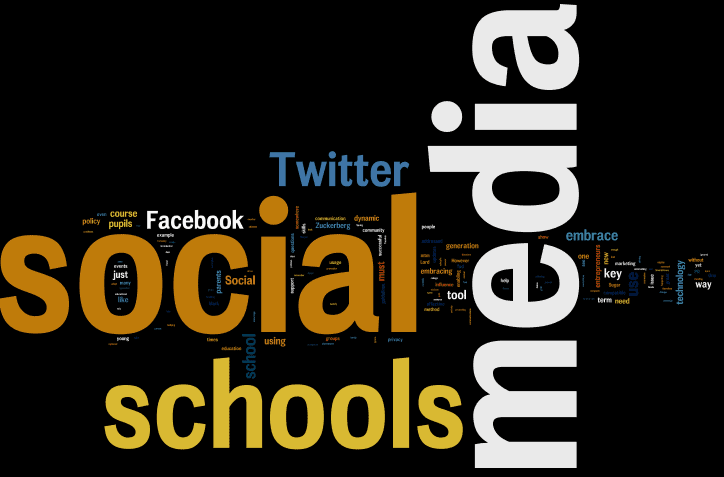
Most schools are already somewhere along the social media continuum: between ignoring and prohibiting at one end, and embracing and enabling at the other.
There are of course arguments for both extremes. Social media (Facebook, Twitter, MySpace and so forth) continues to be a divisive subject, and a few PR disasters in recent times, namely cyber bullying on Facebook, the use of Twitter in the 2011 riots and most recently the rise of the ‘Troll’, have given the ‘anti’ campaign plenty of fuel.
However you look at social media, it is without a doubt an incredibly successful phenomenon, and has proved not just to be a fad. The fad is in the hype surrounding it.
[fusion_builder_container hundred_percent=”yes” overflow=”visible”][fusion_builder_row][fusion_builder_column type=”1_1″ background_position=”left top” background_color=”” border_size=”” border_color=”” border_style=”solid” spacing=”yes” background_image=”” background_repeat=”no-repeat” padding=”” margin_top=”0px” margin_bottom=”0px” class=”” id=”” animation_type=”” animation_speed=”0.3″ animation_direction=”left” hide_on_mobile=”no” center_content=”no” min_height=”none”]

Does your school make the most of social media?
The more Social media becomes part of our daily life, the less sensational it will be. As the “Z” generation matures, social media will be as normal as a communications tool as text messaging is to the “Y” generation and telephone calls are to the “X”. One thinks of our politicians embracing Twitter (if in a slightly haphazard way) as a sign that even our great leaders see the need to use social media. The trailblazers for social media , such as Facebook’s Mark Zuckerberg, have replaced the term “zeitgeist” and bastardized “trending”, allowing social media to dictate and perpetuate social values.
But how do schools cope with such a fluid and dynamic medium? How do they catch up (in many cases) and then how do they adapt?
One of the UK’s most successful sports managers, Sir Clive Woodward, gave each of his World Cup-winning England rugby squad a state-of-the-art laptop, believing that to embrace technology was key to embracing new ideas in general, and assessed each of his players’ propensity to learn.
In the same way, schools have addressed the need to embrace technology as a learning tool, and have been pioneers in enabling young people to gain IT skills – greatly improving job prospects and communication skills – with the introduction of an IT curriculum.
Social media is an extension of this. By using examples and case studies on great social media entrepreneurs, like the aforementioned Mr Zuckerberg, Chad Hurley (YouTube), Jeff Bezos (Amazon) and others, we can inspire pupils with alternatives to mainstays like Lord Sugar, Bill Gates and the cast ofDragons’ Den. Certainly they are valid role models, but show a 16-year-old Peter Jones in his suit, and show him Mark Zuckerberg on his skateboard, and the vast majority will pick the latter as their idol. The true irony here is that all of the more established entrepreneurs listed use the young pretenders’ products (see Twitter for entertaining discussion between Lord Sugar and Piers Morgan).
Of course there is the obvious issue of safeguarding – yet another dynamic topic with privacy policies often reactive to the events that grab media attention.
Social media is designed to be the ultimate freedom of expression. Speaking with marketers and teachers at schools, this is a very contentious issue, and one which must be addressed by all schools. A computer usage policy governing IT use in school is outmoded almost as soon as it is written, with updates to sites and technology happening many times in just a term. For example over the course of this Spring term alone, we will have seen a change to the Google privacy policy, the release of a new iPad and key updates to Facebook, to name just a few.
There are key questions therefore which need addressing: What are pupils and staff using social media for? Is any of their activity malicious and is that intentional or not? What impact might this have on the school and it’s PR? How do you monitor all this?!
These are questions which cannot be ignored, no matter what your views are, and yet they seem to be very complex to deal with. It can be argued that while schools side-line the issues, they will grow and the solution may be unwieldy if not dealt with sooner rather than later.
This leads us neatly to parents. Parents and parent groups can have huge influence over school perceptions in the community, affecting recruitment and retention. We must remember that parents use social media as well, and so why not tap into this? Smart use of Twitter for example can help to promote events and success, underlining your school’s key marketing messages.
Empowering Heads of department as user groups within school is a good way of promoting social media use without putting the burden on an individual. Strict guidelines on usage agreed with parents can be put in place and the results can be very effective inside and outside school.
This is just one way of using social media, barely a scratch on the surface (having not even mentioned Wikipedia, Youtube or the influence of Smartphones and emerging technology).
The answer to our question is that schools and social media are compatible. The people in your school or college are the ones driving forward this new method of communication and community participation. Clearly it is essential that schools must have more than a passing knowledge of what social media is and does, so they can support the next generation of entrepreneurs like Jamal Edwards.
Enabling and education – of both schools and their pupils – is key to using social media as a tool in an education environment and prevention will undoubtedly lead to a culture of subversion.
So – to ignore or to embrace? It is unrealistic to believe that there is enough support from Government and our societal conferences to enable schools to fully embrace social media, and effective policy and guidelines are of course needed to combat the negative aspects. However, it is not going away. Social media is an exciting and dynamic tool, with the potential to have a very positive effect on schools, not only as a marketing tool, but as an educational facility for pupils and a method for the promotion of best practice between schools. It must be accepted as such.
Therefore if you are somewhere between ignorance and embrace, to quote the “meme”: “you’re doing it right.”.
For information on how mtm can help your school embrace the world of social media, call us on 0843 308 7548 for a free consultation.
[/fusion_builder_column][/fusion_builder_row][/fusion_builder_container]

